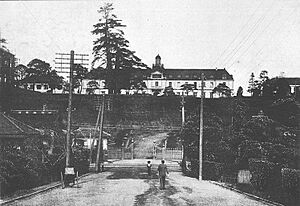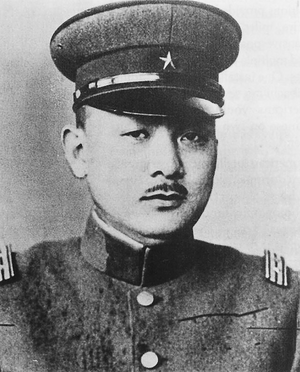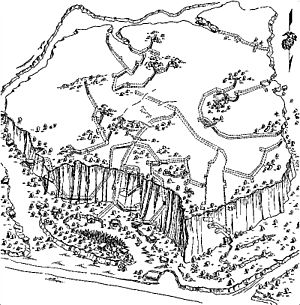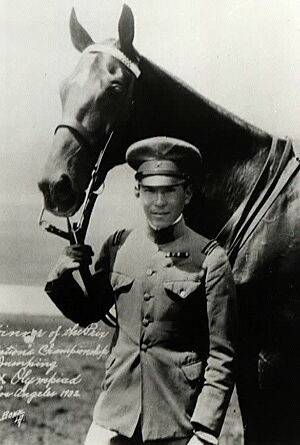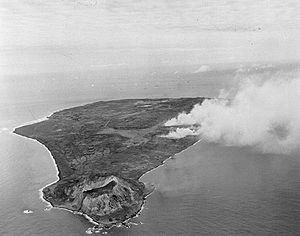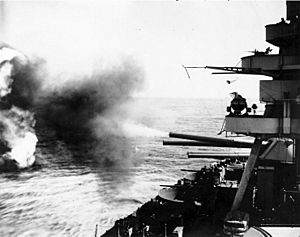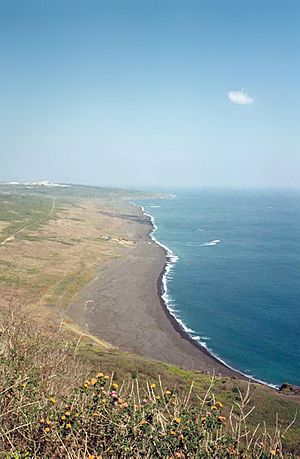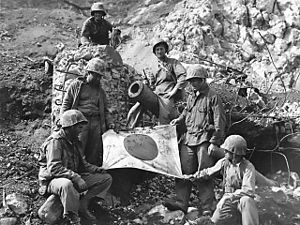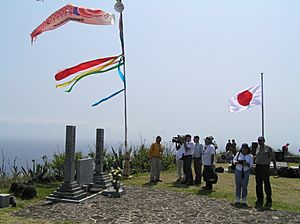Tadamichi Kuribayashi facts for kids
Quick facts for kids
Tadamichi Kuribayashi
|
|
|---|---|
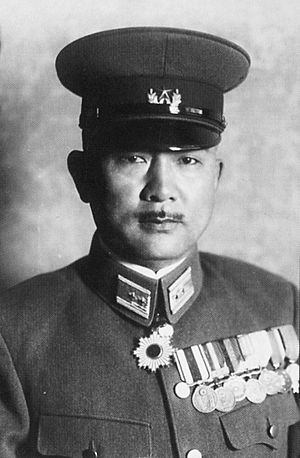
Kuribayashi in 1943
|
|
| Native name |
栗林 忠道
|
| Born | 7 July 1891 Nagano Prefecture, Japan |
| Died | c. March 26, 1945 (aged 53) Iwo Jima, Japan |
| Allegiance | Empire of Japan |
| Service/ |
Imperial Japanese Army |
| Years of service | 1911–1945 |
| Rank | General |
| Unit | 1st Cavalry Brigade 2nd Guards Division 109th Infantry Division |
| Battles/wars | World War II |
| Awards | Grand Cordon of the Order of the Rising Sun (1967; posthumous) Grand Cordon of the Order of the Sacred Treasure Order of the Rising Sun with Gold and Silver Star (2nd class) Order of the Rising Sun, Gold Rays with Neck Ribbon (3rd class) |
| Alma mater | Harvard University |
General Tadamichi Kuribayashi (born July 7, 1891 – died around March 26, 1945) was a high-ranking officer in the Imperial Japanese Army. He was also a writer, a poet, and a diplomat. He is most famous for leading the Japanese forces during the Battle of Iwo Jima.
Before the battle, General Kuribayashi made sure to share the tough conditions with his soldiers. He also stopped the use of "banzai charges," which were attacks where soldiers would rush the enemy without much cover. He thought these attacks wasted lives. The United States Marine Corps expected to capture Iwo Jima in just five days. However, Kuribayashi and his men fought for 36 days. It is believed that Kuribayashi died in battle while leading his soldiers in a night attack. His body was never found by the United States Armed Forces. U.S. Marine Corps General Holland Smith called Kuribayashi "the most challenging" enemy they faced in the Pacific.
Contents
Early Life and Education
Tadamichi Kuribayashi was born into a family with a history of being samurai in Nagano Prefecture, Japan. His family had lived in that area since the 1400s.
Kuribayashi finished high school in 1911. He first wanted to become a journalist. But his teachers convinced him to join the Imperial Japanese Army Academy instead.
He graduated from the Army Academy in 1914, focusing on cavalry (soldiers who fight on horseback). He continued his training at the Army's Cavalry School in 1918. In 1923, he graduated from the Army War College with excellent grades. He even received a special sword from the Emperor Taishō. Kuribayashi married Yoshii Kuribayashi in December 1923. They had three children: a son named Taro and two daughters, Yoko and Takako.
In 1928, Kuribayashi became a military assistant in Washington, D.C., USA. For two years, he traveled across the United States. He studied the country's military and industries. During this time, he also studied at Harvard University.
After returning to Japan, Kuribayashi was promoted to major. He then became the first Japanese military assistant in Canada. In 1933, he was promoted again to lieutenant colonel.
From 1933 to 1937, he worked for the Imperial Japanese Army General Staff in Tokyo. During this time, he wrote songs for the military. In 1940, Kuribayashi became a major general.
Before the Attack on Pearl Harbor, Kuribayashi often told his family that Japan should never fight the United States.
Pacific War Service
In December 1941, General Kuribayashi was sent to the field as the main officer (Chief of Staff) for the Japanese 23rd Army. This army was involved in the Battle of Hong Kong. After the war, the commander of the 23rd Army, Takashi Sakai, was found guilty of war crimes. General Kuribayashi, however, was known for visiting wounded soldiers in the hospital. This was very unusual for a high-ranking officer.
In 1943, he was promoted to lieutenant general. He was then put in charge of the 2nd Imperial Guards Division. This division was mainly for training and reserves. On May 27, 1944, he became the commander of the IJA 109th Division.
Just two weeks later, on June 8, 1944, he received special orders. These orders, signed by Prime Minister Hideki Tōjō, told him to defend the important island of Iwo Jima in the Bonin Islands. His wife, Yoshii Kuribayashi, said that her husband believed he would not return from Iwo Jima.
General Kuribayashi thought that Japan's war against the United States was a situation where no one could truly win. He believed the war should end through peace talks. Some very nationalistic leaders in the military and government saw this as a sign that he was losing hope.
Before he left for Iwo Jima, he had a special meeting with Emperor Hirohito. But in a letter to his family, he didn't mention meeting the Emperor. Instead, he wrote about a draft in their kitchen. He even drew a detailed picture so his son, Taro, could fix it. He wanted to make sure his family wouldn't get cold.
Preparing for the Battle of Iwo Jima
On June 19, 1944, General Kuribayashi arrived on Iwo Jima. The soldiers there were digging trenches on the beach. Kuribayashi carefully explored the island. He then ordered his men to build their defenses further inland, away from the beaches. He decided not to fight hard against the American landings on the beach itself. Instead, he planned to fight the battle mostly from underground. His men dug more than 18 kilometers (11 miles) of tunnels, 5,000 caves, and strong underground bunkers called pillboxes.
Kuribayashi knew he could not hold Iwo Jima forever against the powerful American forces. But he also knew that if Iwo Jima fell, American bombers could easily reach all of Japan. So, he planned to fight a long, slow battle. He hoped this would delay the bombing of Japanese cities. He also hoped it would make the United States think twice about invading Japan itself.
Long before the Americans landed, General Kuribayashi expected to die on Iwo Jima.
To get his soldiers ready for this new way of fighting, Kuribayashi wrote six "Courageous Battle Vows." These vows were shared widely among his men.
The Battle of Iwo Jima
On February 19, 1945, the United States Marine Corps landed its first soldiers on the southern shore of Iwo Jima. General Kuribayashi used a very different strategy. He allowed the American soldiers to land without being attacked at first. Then, his men shelled and machine-gunned them from hidden underground bunkers. As night came, Marine Corps General Holland Smith reviewed the reports. He was very surprised that Kuribayashi's men had not tried a "banzai charge."
Later in the battle, General Kuribayashi gathered the remaining Japanese soldiers into a heavily protected ravine. The Marines called this area "The Gorge."
Marine Corps General Graves B. Erskine sent Japanese American Marines and captured Japanese soldiers to try and convince Kuribayashi and his men to surrender.
On the evening of March 23, 1945, Kuribayashi sent his last radio message to Major Hori. He said, "All officers and men of Chichi Jima – goodbye from Iwo." Major Hori later remembered trying to contact them for three days after that, but he never received an answer.
On March 17, 1945, the General had sent a farewell message to his headquarters. It included three traditional Japanese death poems. A historian named Kumiko Kakehashi said these poems were a quiet protest against the military leaders who so easily sent men to die.
He ended his message with these three poems:
Unable to complete this heavy task for our country
Arrows and bullets all spent, so sad we fall.
But unless I smite the enemy,
My body cannot rot in the field.
Yea, I shall be born again seven times
And grasp the sword in my hand.
When ugly weeds cover this island,
My sole thought shall be the Imperial Land.
How General Kuribayashi Died
The exact way General Kuribayashi died is still a mystery. It is most likely that he was killed in battle early on March 26, 1945. He was leading his remaining soldiers in a surprise attack against sleeping Marines and Air Force ground crews. Kuribayashi and his men quietly cut tents, used bayonets on sleeping soldiers, and threw hand grenades. The official history of the United States Marine Corps states, "The Japanese attack on the early morning of 26 March was not a banzai charge, but an excellent plan aiming to cause maximum confusion and destruction." The attack ended in a fierce hand-to-hand fight. The General's body could not be identified afterward because he had removed all his officer's badges. He wanted to fight like a regular soldier.
Some less certain theories suggest that Kuribayashi might have taken his own life (committed seppuku) at his headquarters in the Gorge.
The General's son, Taro Kuribayashi, spoke with several Japanese soldiers who survived the battle. Based on these talks, he believes his father was killed by an artillery attack during the final assault.
Legacy and Impact
The U.S. declared Iwo Jima secure on March 26, 1945. The Americans had 26,039 casualties (soldiers killed or wounded). Out of 22,786 Japanese defenders, only 1,083 survived and were captured. A few Japanese soldiers continued to hide in caves, coming out at night to steal food. The last two, Yamakage Kufuku and Matsudo Linsoki, surrendered on January 6, 1949.
Yoshii Kuribayashi was only 40 years old when her husband died. She worked very hard to raise their children without a father. Her daughter, Takako Kuribayashi, said that her mother had never worked before. But she managed to raise them during the difficult years after the war. She even sold cuttlefish on the street. Takako also said that her mother sent both her elder brother and her, a girl, to university.
Many years later, Yoshii Kuribayashi visited Iwo Jima to honor her husband.
See also
 In Spanish: Tadamichi Kuribayashi para niños
In Spanish: Tadamichi Kuribayashi para niños
- Yoshitaka Shindō – A Japanese political figure and General Kuribayashi's grandson.
 | Misty Copeland |
 | Raven Wilkinson |
 | Debra Austin |
 | Aesha Ash |


